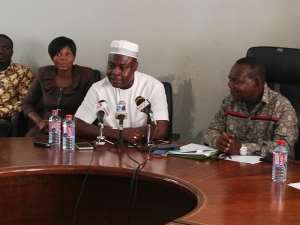
Textile manufacturing in Ghana is an industry consisting of ginneries and textile mills producing batik, wax cloth, fancy printed cloth and Kente cloth.
The industry has shown signs of significant growth in recent years, promoting high-quality traditionally designed fabrics as "Made in Ghana" to niche markets, especially the US.
Today, Ghana's textiles industry include vertically integrated mills, horizontal weaving factories and the traditional textile manufacturing firms involved in spinning, hand-weaving and fabric-processing.
However, there is a challenge of how to ensure that quality fabrics and prints are produced to meet international standards and further cut down importation and smuggling of goods.
It is against this background that the reconstituted National Technical Committee for Textiles and Garments has been inaugurated to work and ensure that Ghana meets the requirements for the production of textiles and garment for local and international markets.
The Committee is currently made up of 22 experts, who would be responsible for the development and promulgation of standards for the Textiles and Garment industry.
Addressing the gathering, Madam Eunice Antiaye, Head of Textiles and Garment Department, Accra Technical University, who doubles as the Chairperson of the Committee assured that the committee would utilise their expertise to encourage producers and manufacturers in Ghana to come out with quality products through applicable standards for the market.
"The work items that had been proposed include; size-designation for men and boys' garments, women and girls' garments, then size-designation for men and boys' underwear, night wear and shirts. Size designation for women and girls underwear, foundation garment and shirts. Garment construction, Professional care in terms of cleaning and finishing, assessment, care labelling codes as well as the code of practice for garment producers, and review some of the standards for the industry," she stated.
On his part, the Trade Ministry's Representative, Mr Nyame Berfi, Director in-charge of Multilateral, Regional and Bilateral Trade at the Ministry who inaugurated the Committee on behalf of Mr Alan Kwadwo Kyeremarten, the Sector Minister, said Ghana could not take full advantage of the African Growth and Opportunity Act (AGOA) due to sub-standard goods.
He emphasised the importance of rigidly keeping to applicable standards as far as the Textiles and Garment industry was concerned and tasked the Committee to pay attention to the variety of fabrics, material and finishes in the production of textile articles and for modifications in the description of care processes.
Mr Kyeremanten also tasked the members of the Committee to use their expertise to come out with standards and requirements needed to ensure safety and quality of products from the industry.
Professor Alex Dodoo, Director General of the GSA said the Committee members represented capable men and women in the country who set standards for the nation in line with international standards.
He said quite often, most of the standards that were operational in the country were not known while other standards faced the challenges of enforcement and the GSA was determined to ensure that whatever standards were set, 'to the extent permissible in law' were implemented.
Prof Dodoo mentioned challenges confronting the textile and garment industry as; sub-standard buttons, zips, tread, under-sized measuring tapes as well as the inability to penetrate the job markets.
'The task we have thrown to the Technical Committee is that Ghanaian clothes have sizes, please let's know the standards for our sizes-for Fugu, for Kaftan and so on. That's the only way we can trade online.
He said the textile industry was a critical area creating jobs for the people and so the need to put in place the quality infrastructure in terms of the quality of tread, fabric, dyes and the sizes available in tune with the best standards for higher patronage.
He disclosed that GSA was sourcing for funds to build a textile lab in Ghana like that of Ivory Coast, to support the Ghanaian industry.








 We’ll no longer tolerate your empty, unwarranted attacks – TUC blasts Prof Adei
We’ll no longer tolerate your empty, unwarranted attacks – TUC blasts Prof Adei
 Bawumia donates GHc200,000 to support Madina fire victims
Bawumia donates GHc200,000 to support Madina fire victims
 IMF to disburse US$360million third tranche to Ghana without creditors MoU
IMF to disburse US$360million third tranche to Ghana without creditors MoU
 Truck owner share insights into train collision incident
Truck owner share insights into train collision incident
 Paramount chief of Bassare Traditional Area passes on
Paramount chief of Bassare Traditional Area passes on
 Two teachers in court over alleged illegal possession of BECE papers
Two teachers in court over alleged illegal possession of BECE papers
 Sunyani: Victim allegedly shot by traditional warriors appeals for justice
Sunyani: Victim allegedly shot by traditional warriors appeals for justice
 2024 elections: We've no trust in judiciary; we'll ensure ballots are well secur...
2024 elections: We've no trust in judiciary; we'll ensure ballots are well secur...
 Performance tracker: Fire MCEs, DCEs who document Mahama's projects; they're not...
Performance tracker: Fire MCEs, DCEs who document Mahama's projects; they're not...
 Train crash: Railway ministry shares footage of incident
Train crash: Railway ministry shares footage of incident
